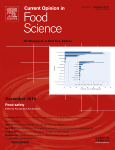
Current Opinion in Food Science
Scope & Guideline
Shaping Tomorrow's Food Landscape Today
Introduction
Aims and Scopes
- Food Safety and Microbiology:
Research focusing on the safety of food products, including the role of pathogens, mycotoxins, and microbial interactions within food systems. It emphasizes innovative methods for detection and control. - Functional Foods and Nutraceuticals:
Exploration of bioactive compounds in foods that promote health benefits, including studies on dietary polyphenols, probiotics, and the development of functional ingredients to enhance health. - Food Processing Technologies:
Advancements in processing technologies, including non-thermal methods, encapsulation techniques, and fermentation processes aimed at improving food quality and safety. - Consumer Science and Sensory Evaluation:
Investigations into consumer perceptions, preferences, and sensory evaluations of food products, including the impact of cultural and environmental factors on food acceptance. - Sustainable Food Systems:
Research addressing sustainability in food production, including plant-based alternatives, waste reduction strategies, and the role of innovative technologies in promoting eco-friendly practices. - Analytical Techniques in Food Science:
Application of advanced analytical methods, such as metabolomics, proteomics, and genomic approaches, to assess food quality, safety, and nutritional value.
Trending and Emerging
- Plant-Based Innovations:
A significant rise in research related to plant-based foods, including meat alternatives, plant proteins, and the health benefits of plant-based diets, indicating a shift in consumer preferences. - Foodomics and Multi-Omics Approaches:
An emerging trend in the use of foodomics and multi-omics methodologies to explore the interactions between food components and health outcomes, highlighting the importance of comprehensive data analysis. - Sustainable Practices and Technologies:
Growing emphasis on sustainability in food production, including waste reduction, bioprocessing, and the use of alternative ingredients, reflecting a broader societal push towards eco-friendliness. - Food Safety Innovations:
Increasing attention to novel technologies for food safety, including biosensors, predictive modeling, and advanced microbial control strategies, in response to public health concerns. - Consumer Behavior and Acceptance Studies:
Emerging interest in understanding consumer behavior towards health-related claims and sensory attributes of foods, particularly in the context of dietary changes and health trends. - Bioactive Compounds and Health Benefits:
A rise in research investigating the health-promoting properties of bioactive compounds derived from various food sources, focusing on their roles in disease prevention and wellness.
Declining or Waning
- Traditional Food Preservation Methods:
There is a noticeable decrease in publications focusing on conventional preservation techniques (e.g., canning, pickling) as attention shifts towards innovative and sustainable alternatives. - Animal-Based Protein Sources:
Research on traditional animal protein sources is waning, likely due to the growing emphasis on plant-based diets and alternatives that align with sustainability goals. - Basic Nutritional Studies:
Basic nutritional studies lacking a practical application or connection to food technology are becoming less frequent, as the journal prioritizes applied research with direct implications for food science. - Monodisciplinary Approaches:
There is a gradual decline in purely monodisciplinary studies, as interdisciplinary approaches integrating food science with other fields such as biotechnology, health sciences, and environmental studies gain traction.
Similar Journals
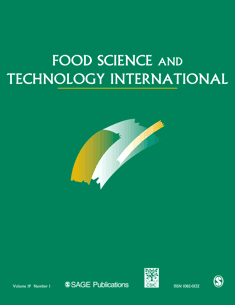
FOOD SCIENCE AND TECHNOLOGY INTERNATIONAL
Pioneering research for a sustainable food industry.FOOD SCIENCE AND TECHNOLOGY INTERNATIONAL, published by SAGE Publications Ltd, is a premier journal in the fields of food science and technology, serving as a crucial platform for the dissemination of innovative research and practical applications from 1995 through to 2024. With an impact factor reflecting its significant standing—ranking in the Q2 quartile for Chemical Engineering, Food Science, and Industrial and Manufacturing Engineering—this journal plays an instrumental role in advancing the interdisciplinary study of food systems. Researchers, professionals, and students can access high-quality contributions that address the latest developments and trends in food technology, safety, and processing. Located in the United States, FOOD SCIENCE AND TECHNOLOGY INTERNATIONAL also boasts commendable Scopus rankings, ensuring its articles are both relevant and widely cited within the academic community. As a vital resource for anyone engaged in food science research, этот журнал fosters knowledge sharing and innovation in the ever-evolving landscape of food technology.

Journal of Food and Nutrition Research
Bridging Research and Real-World Nutrition SolutionsJournal of Food and Nutrition Research, published by the VUP FOOD RESEARCH INST in Bratislava, Slovakia, serves as a vital platform for disseminating cutting-edge research in the fields of food science and nutrition. With an ISSN of 1336-8672 and an E-ISSN of 1338-4260, this journal emphasizes the importance of interdisciplinary approaches to address contemporary challenges related to food quality, dietary practices, and nutritional health. Notably recognized in the 2023 Scopus rankings, the journal is classified in Q3 quartiles for both Food Science and Nutrition & Dietetics, providing a forum for researchers aiming to enhance knowledge and practices within these domains. Those engaged in academia and industry will find the journal invaluable for its comprehensive scope, which covers novel food technologies, nutrition interventions, and the implications of dietary behaviors. Though not open access, the journal is dedicated to enriching the academic conversation and contributing to advancements in public health and nutrition policies.

Food Chemistry-X
Exploring the Molecular Wonders of Food.Food Chemistry-X is a premier open-access journal published by Elsevier, dedicated to advancing the field of food chemistry through high-quality research and comprehensive reviews. With its ISSN of 2590-1575, the journal has gained significant attention since adopting an open-access model in 2019, allowing wide dissemination of knowledge and innovations in food science. Based in the United Kingdom, it holds prestigious Q1 rankings in both Analytical Chemistry and Food Science categories as of 2023, positioning itself as a leading platform for researchers worldwide. The journal's focus spans extensive topics within food chemistry, including food safety, nutritional analysis, and the chemical properties of food, offering insights that are crucial for addressing contemporary challenges in food production and consumption. With a Scopus rank placing it in the 65th percentile among the top journals in Food Science and the 58th percentile in Analytical Chemistry, Food Chemistry-X is an essential resource for academics, professionals, and students seeking to stay at the forefront of research and innovation in this vibrant field.

Food Science of Animal Resources
Leading the Charge in Animal Resources and Food Safety ResearchFood Science of Animal Resources is a prestigious, peer-reviewed journal published by the Korean Society of Food Science and Animal Resources, serving as a vital platform for disseminating advanced research in the fields of Animal Science and Food Science. Since its inception in 2018, the journal has quickly established itself with an impressive Q1 ranking in both categories for 2023, indicating its relevance and influence in the academic community—evident by its ranking of #23 in Animal Science and Zoology and #78 in Food Science among thousands of journals. Operating on an Open Access model since 2019, it enables unrestricted access to cutting-edge research for a global audience, facilitating collaboration and innovation. Its commitment to quality and rigor makes it an essential resource for researchers, professionals, and students dedicated to advancing knowledge in food safety, nutrition, and sustainable practices within the animal resource sector. Set against the vibrant backdrop of South Korea, the journal aims to bridge gaps in knowledge and foster communication among scholars and practitioners worldwide.
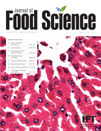
JOURNAL OF FOOD SCIENCE
Bridging Research and Application in Food ScienceJOURNAL OF FOOD SCIENCE, published by Wiley, is a premier journal dedicated to advancing the field of food science, bridging the gap between fundamental research and practical application. With an impressive impact factor reflecting its authoritative status, the journal is ranked in the Q1 quartile for Food Science in 2023 and boasts a Scopus ranking of #71 out of 389, placing it in the 81st percentile within Agricultural and Biological Sciences. First launched in 1936, the journal continues to serve as an essential platform for researchers, professionals, and students to disseminate innovative studies and reviews that address critical issues in food quality, safety, and technology. While not currently offering open access, its rigorous peer-review process ensures the dissemination of high-quality and impactful research. Researchers engaged in the vital disciplines of food science will find this journal indispensable for keeping abreast of cutting-edge developments in the field.

Current Research in Food Science
Shaping the Landscape of Food Science InnovationCurrent Research in Food Science is a leading peer-reviewed academic journal published by Elsevier, specializing in the dynamic field of food science. Since its transition to an Open Access model in 2019, the journal has broadened its reach, contributing significantly to the dissemination of high-quality research. With strong rankings, including a Q1 quartile status in Applied Microbiology and Biotechnology, Biotechnology, and Food Science, it stands out as a pivotal resource for scholars. Based in the Netherlands, current research published within its pages spans a wide range of relevant topics, ensuring that researchers and practitioners stay abreast of the latest advancements. The journal's impressive Scopus rankings enhance its credibility, with a percentile standing in the 74th to 83rd range across relevant categories, underscoring its impact and importance in the academic community. Current Research in Food Science aims to foster the exchange of innovative ideas and foster collaborative efforts among researchers, making it an essential resource for those engaged in advancing the science and technology of food.
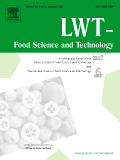
LWT-FOOD SCIENCE AND TECHNOLOGY
Exploring the science behind food quality.LWT - Food Science and Technology is a premier academic journal published by Elsevier, specializing in the multifaceted fields of food science and technology. With a distinguished presence since its inception in 1973, this journal has evolved to become a vital resource for researchers and professionals aiming to advance knowledge in food safety, preservation, processing, and sensory analysis. Currently ranked in the Q1 quartile of food science journals, it holds an impressive Scopus ranking of 22 out of 389 in the Agricultural and Biological Sciences category, placing it in the 94th percentile. While certain articles may be available via subscription, LWT is committed to disseminating cutting-edge research that enhances food quality and innovation. This journal not only serves as a critical platform for the exchange of scientific ideas but also addresses contemporary challenges in food technology, ensuring that it remains essential for scholars, industry professionals, and students alike seeking to contribute to and stay abreast of advancements in the field.
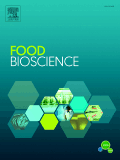
Food Bioscience
Shaping the Future of Food Science with Cutting-Edge ResearchFood Bioscience is a leading peer-reviewed journal published by Elsevier, dedicated to advancing the understanding of the complex interplay between food science and biosciences. With an impressive Impact Factor that places it in the Q1 and Q2 quartiles for Food Science and Biochemistry respectively, the journal consistently ranks among the top publications in its field, reflected in its Scopus rankings (Rank #83/389 in Food Science and Rank #175/438 in Biochemistry). Since its inception in 2013, Food Bioscience has fostered a multidisciplinary approach, bridging gaps between research in agricultural, biological, and food sciences, thus encouraging innovative solutions to the pressing challenges facing the global food supply chain. Although it currently operates under a subscription model, the journal is committed to disseminating high-quality research, making significant contributions to both academic scholarship and industry practices. Researchers, professionals, and students alike are invited to explore the wealth of knowledge contained within its pages as it plays a pivotal role in shaping the future of food bioscience.
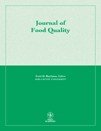
JOURNAL OF FOOD QUALITY
Elevating Food Science through Quality ResearchThe Journal of Food Quality, an esteemed publication under Wiley-Hindawi, stands as a vital resource in the dynamic field of Food Science, established since 1977 and operating under an Open Access model since 2017. With its seat in the United Kingdom, this journal focuses on delivering high-quality research and insights pertaining to food safety, risk management, and quality assurance, reflected in its impressive Q2 ranking in both Food Science and Safety, Risk, Reliability and Quality categories in 2023. Researchers and professionals will find the journal’s contributions indispensable, particularly given its Scopus rankings that place it in the top echelons of its fields, highlighting its impact and relevance. By fostering an environment of knowledge sharing, the Journal of Food Quality not only enhances academic dialogue but also supports innovation and best practices in food research and industry applications.
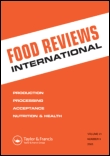
FOOD REVIEWS INTERNATIONAL
Transforming Research into Practical Solutions for the Food IndustryFOOD REVIEWS INTERNATIONAL, published by Taylor & Francis Inc, serves as a pivotal resource within the fields of Food Science and Chemical Engineering. Established in 1985, this esteemed journal offers a comprehensive platform for the dissemination of critical reviews that enhance understanding and innovation in the food industry. With an impressive impact factor reflecting its Q1 quartiles in both Food Science and Chemical Engineering categories, it ranks among the top journals in Scopus, securing the 24th spot in Agricultural and Biological Sciences. Scholars, researchers, and professionals are encouraged to explore its rich content, which spans meticulously reviewed articles that bridge academic research and practical applications, while contributing to advancements in food safety, processing, and sustainability. Although not an Open Access journal, access to its extensive repository is vital for anyone aiming to stay at the forefront of food science advancements.